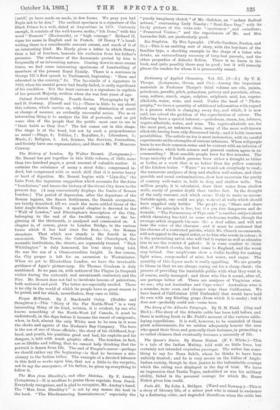The Handwriting of the Kings and Queens of England. By
W. J. Hardy. (Religious Tract Society.)—This is a volume of curious and varied interest, of which, however, it is difficult to give our readers any adequate idea with the means at our disposal. It will easily be understood that the illustrations, being repro- ductions in fac-simile of the handwritings in question, are the most attractive and significant part of the book These must be seen to be appreciated. Some of the matter and of the illustrative specimens of writing, has already appeared in the Leisure Hour, but no inconsiderable portion is absolutely new to the public,— indeed, it was but a very short time ago that they were discovered, among some uncalendered documents, in the Record Office. A holograph letter by Henry IV., and a sentence written by Edward IV. (whose penmanship was known before by the letters
"E. R.") are among these discoveries. The latter is an authorisa- tion, addressed to the Chancellor, relating to a Commission to try some rioters at Bristol. It runs thus :—"Cosyn yff ye thynke ye sohult have a warrent thys, our wryten, shall soffyse on to [until] ye have made on made, in dew forme. We pray you hyt Fayle not to be don." The earliest specimen is a signature of the Black Prince to a writ, dated at Angoulame in 1370. Curiously enough, it consists of the well-known motto," Loh Done," with the word " Homout " (Hochmuth), or " high courage." Richard IL signs his name in English and in French. Of Henry V.'s hand- writing there is a considerable amount extant, and much of it of an interesting kind. Mr. Hardy gives a letter in which Henry, then a lad of fourteen, laments his exclusion from his father's presence. The substance of the documents quoted by him is frequently of an interesting nature. Coming down to more recent times, we find some interesting specimens of handwriting of members of the present Royal Family. There is a sentence in George III.'s first speech to Parliament, beginning : "Born and educated in the country," &b. The fac-simile of a signature in 1810, when his mental power had finally failed, is sadly significant of his condition. Not the least curious is a signature in capitals of her present Majesty, written when she was four years of age.



















































 Previous page
Previous page